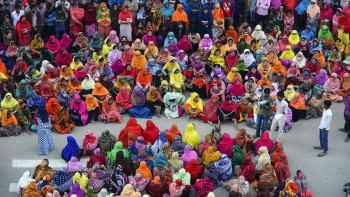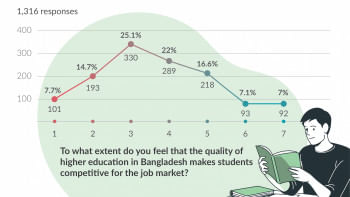Two sides of the same conundrum

In a world infested with media gurus, I don't think any professional job search coach could have suggested what Mukta Sultana did. The young woman, who reached the maximum age limit for applying for a public job last year, appeared on Facebook Live last month and burnt all her academic certificates. The graduate from Eden Women's College had to work part-time to support not only her studies, but also her family, as she had her breadwinner father early in life.
Mukta moved to Dhaka from Kishoreganj to avert early marriage, as she wanted to be independent. Working alongside her studies affected her academic performance, according to a TV interview that she gave following her certificate burning social media spectacle. Mukta achieved her master's degree in 2019 and failed to get any job. The entry-level jobs in the private sector would hardly cover her travel and food expenses. She started preparing for government jobs, but the window to get one closed down last year, when she turned 30 years old. Mukta's interview was watched by our ICT State Minister Zunaid Ahmed Palak, who took the initiative to offer her a job at a digital literacy project.
It is good to see a public official with a heart. The state minister had the option of being angry and coming after Mukta with a punishment under the Digital Security Act (DSA) for trying to "tarnish the government's image." He could have instructed the education boards concerned to cancel her degrees altogether. Mukta took a calculated risk in her attempt to draw attention to the ongoing movement by a section of students demanding an extension of the age limit to apply for public service jobs to 35 years. They argue that with 30 as an entry benchmark, many graduates don't get enough time to prepare and apply after graduation. The delay in result publication and session jams further shrink the job application window. The protesters also demanded an extension of the retirement age limit and a reduction of application fees.
The fate of the protesters who tried to bring attention to their causes by waylaying Dhaka's Shahbagh intersection was not as pearly as Mukta's. They were baton-charged and dispersed by the police. Mukta, in a follow-up interview, sympathised with her comrades and said that she had mentioned their demands to the state minister during her meeting. While I am happy for Mukta, I feel there are many more humane stories out there that need our sympathetic hearing.
Prolonging the stay of an employee in service impedes fresh graduates from joining the workforce. This gives us a perspective of the other side of the conundrum where job-seekers such as Mukta are located. The presence of senior workers in the system creates further complications as they hamper the promotion of officers who are already in the system.
I received an email from a reader of my column, who said he had been selected for a job at Rupali Bank almost two years ago. Post his employment, his family arranged for his marriage. But in the last two years, the appointment process has not been completed. His wife's family is now suspicious of his "claim" of getting a bank job and threatening a divorce. Any sympathetic intervention can probably save the future of this young couple.
Then again, addressing a humane case will not address the issue that runs deep in the system. For instance, age-related human resource management including recruitment, retention and retirement is related to demographic changes in societies. In France, employees have taken to the streets as the government has passed a bill to increase the retirement age to 64 from 62. The longevity of its nationals has been taken into consideration to calculate the retirement benefits of an employer. While the employees feel that by 62, they have already served their offices enough to earn the perks to enjoy the rest of their lives. Conversely, in our country, we see that an employer still has a lot to give to their institutions at the time of their retirement at 60. They lobby for extensions. Some of them use their public offices to avail of various training opportunities to prepare for the post-retirement phase. The generous scholarship given to in-service, mid-career officers to pursue higher degrees abroad is a case in point. I have not come across any impact report on the government's huge expenses related to these career development initiatives.
Prolonging the stay of an employee in service impedes fresh graduates from joining the workforce. This gives us a perspective of the other side of the conundrum where job-seekers such as Mukta are located. The presence of senior workers in the system creates further complications as they hamper the promotion of officers who are already in the system.
While listening to Mukta's interview that she gave on Bayanno TV, another stark reality of unemployment and underemployment became apparent. She said those who dropped out of her schools were driving auto-rickshaws or working in the fields to earn a modest living. Even after investing 27 years in education, she was finding it difficult to get an office job with more than Tk 10,000 a month. If the state minister had not given her the job, she would have been forced to take a job at a garment factory just to survive.
The mismatch between degrees sought and jobs available is another contentious but related issue. While public jobs are given through knowledge-oriented tests, which demand rote learning, private jobs demand people and professional skills. Mukta's failure to get a job in the private sector can be due to multiple reasons. She is nevertheless a strong, independent woman who just needed an opportunity to prove herself. The state minister has given her one. Indeed, as Thomas Gray puts it, there are "many a gem of purest ray serene" that are found in "the dark unfathom'd caves of ocean" and "full many a flower" that is "born to blush unseen" in the desert. Our sympathies need to extend beyond social media spectacles and bring all these job-seekers under a strategic inclusionary project. And we will need more than a state minister to work together to make that happen.
Dr Shamsad Mortuza is a professor of English at Dhaka University.

 For all latest news, follow The Daily Star's Google News channel.
For all latest news, follow The Daily Star's Google News channel. 










Comments